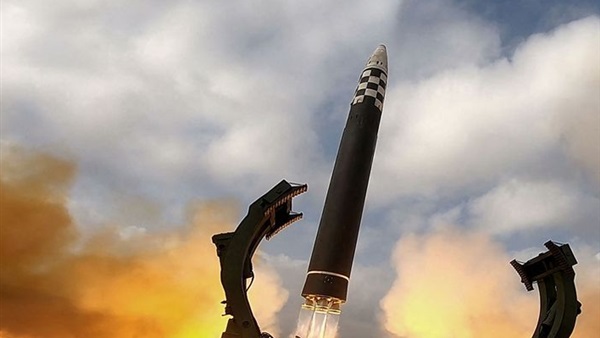South Korean President Says Country Could Develop Nuclear Weapons

South Korean President Yoon Suk -yeol said the country could
develop its own nuclear weapons or ask the U.S. to redeploy them on the Korean
Peninsula if the threat from North Korea grows, in the first time a leader of
the country has explicitly raised the prospect in decades.
The prospect of South Korea, a nonnuclear state, acquiring
its own weapons threatens to destabilize nuclear disarmament efforts and
inflame already high tensions with Pyongyang. The idea has long been rejected
by the U.S. and previous administrations in Seoul, although polls have shown it
is supported by a majority of the public in South Korea.
“If the issue becomes more serious, we could acquire our own
nuclear weapons, such as deploying tactical nuclear weapons here in South
Korea,” Mr. Yoon said after meeting South Korean defense officials on
Wednesday. “But it is important to choose realistically possible options,” he
added, saying that the U.S. and South Korea are discussing sharing information
and jointly executing plans to deter North Korea’s nuclear threat.
South Korea’s presidential office released the remarks on
Thursday, stressing that there had been no change in the country’s policy of
abiding by the Nonproliferation Treaty. “In order to effectively deter North
Korea’s threats, our government has been focusing on strengthening the
U.S.-South Korea extended deterrence,” the presidential office said.
North Korean leader Kim Jong Un, shown on TV on Jan. 1, has
launched a spree of weapons tests recently.
North Korean leader Kim Jong Un’s spree of weapons tests and
growing nuclear threat have fueled a debate in South Korea over the deployment
and development of nuclear weapons as a deterrent. Mr. Yoon has pushed for
Washington to allow Seoul to be more involved in the management of nuclear
weapons, including planning and joint exercises.
South Korea is protected under the U.S. nuclear umbrella, an
agreement that says Washington will use its nuclear weapons to defend its ally.
The U.S. withdrew its tactical nuclear weapons from South Korea in the early
1990s under a disarmament deal with the Soviet Union, and Washington has
rejected calls to redeploy them.
Park Chung-hee, a dictator who ruled South Korea for nearly
two decades before his 1979 assassination, had sought to develop nuclear
weapons but dropped the plan due to opposition from the U.S., according to
documents declassified in 2008. Mr. Yoon made the first significant comments
from a South Korean leader on the possibility of nuclear armament since then,
said Cheon Seong-whun, a former South Korean National Security Council
official.
“Yoon’s remarks signal a paradigm shift in dealing with
North Korea’s nuclear threat,” Mr. Cheon said.
South Korea’s opposition party condemned Mr. Yoon’s remarks,
calling it “absolutely unrealistic” and inappropriate as tensions escalate on
the Korean Peninsula. “If we pursue nuclear armament, how would we call on
North Korea to give up its nuclear weapons?” opposition party leader Lee
Jae-myung said on Thursday.
The U.S. remains committed to the denuclearization of the
Korean Peninsula and South Korea has made clear they are not seeking nuclear
weapons, White House National Security Council spokesman John Kirby said during
a Thursday press briefing.
“What we are going to seek, jointly together with them, are
improvements in extended deterrence capabilities,” Mr. Kirby said.
The only effective way to reduce nuclear threats on the
Korean Peninsula is by curbing the proliferation of nuclear weapons, an NSC
spokesman added.
Robert Einhorn, a senior fellow at the Brookings Institution
and a former senior State Department official, said it wasn’t clear why Mr.
Yoon would discuss a South Korean nuclear weapon now, but suggested it could be
to placate domestic supporters, to prod Beijing to rein in Pyongyang, or to
pressure the Biden administration for a bigger role in the development of the
U.S.’s extended deterrent.
“Senior Yoon administration officials say they support
reliance on a strengthened U.S. extended nuclear deterrent, not South Korea
acquiring its own nuclear weapons, and they say they are working with American
officials in an effort to strengthen it,” Mr. Einhorn said.
Support for developing nuclear weapons in South Korea has
risen at times of heightened tension with North Korea. A poll by the Chicago
Council of Global Affairs showed support stood at about 55% in 2018, when
leaders from the two countries engaged in a series of summits. With
negotiations stalled and North Korea on a missile-testing spree, support had risen
to 70% last year.
Mr. Yoon’s remarks are aimed at signaling to North Korea
that South Korea is willing to consider extreme measures if Pyongyang continues
to threaten Seoul with its weapons program, analysts said. But it is unlikely
that Washington will seriously consider more nuclear weapons on the Korean
Peninsula as an option, they said.
When Mr. Yoon was elected in March he promised to take a
tougher stance on North Korea. Last year, North Korea tested a record number of
missiles and passed a law allowing pre-emptive nuclear strikes against the
South.
Some South Korean lawmakers have called for the U.S. to
permanently station nuclear-armed submarines or aircraft carriers near the
Korean Peninsula. Others have suggested an arrangement similar to the North
Atlantic Treaty Organization, in which South Koreans would be trained to
deliver U.S. nuclear weapons in the event of a conflict. But Washington has
rejected such calls.
Mr. Yoon has used increasingly heated rhetoric in recent
weeks after Pyongyang flew five drones over South Korean territory last month.
He has vowed punishment and retaliation against the North and said the U.S.
nuclear umbrella isn’t sufficient to reassure the South Korean public in the
face of an increasingly aggressive North Korea.
“The North Korean nuclear threat is not only a threat to
South Korea or an issue of the U.S. merely protecting South Korea,” Mr. Yoon
said on Wednesday. “It is now a common interest for South Korea, Japan and the
U.S.”









